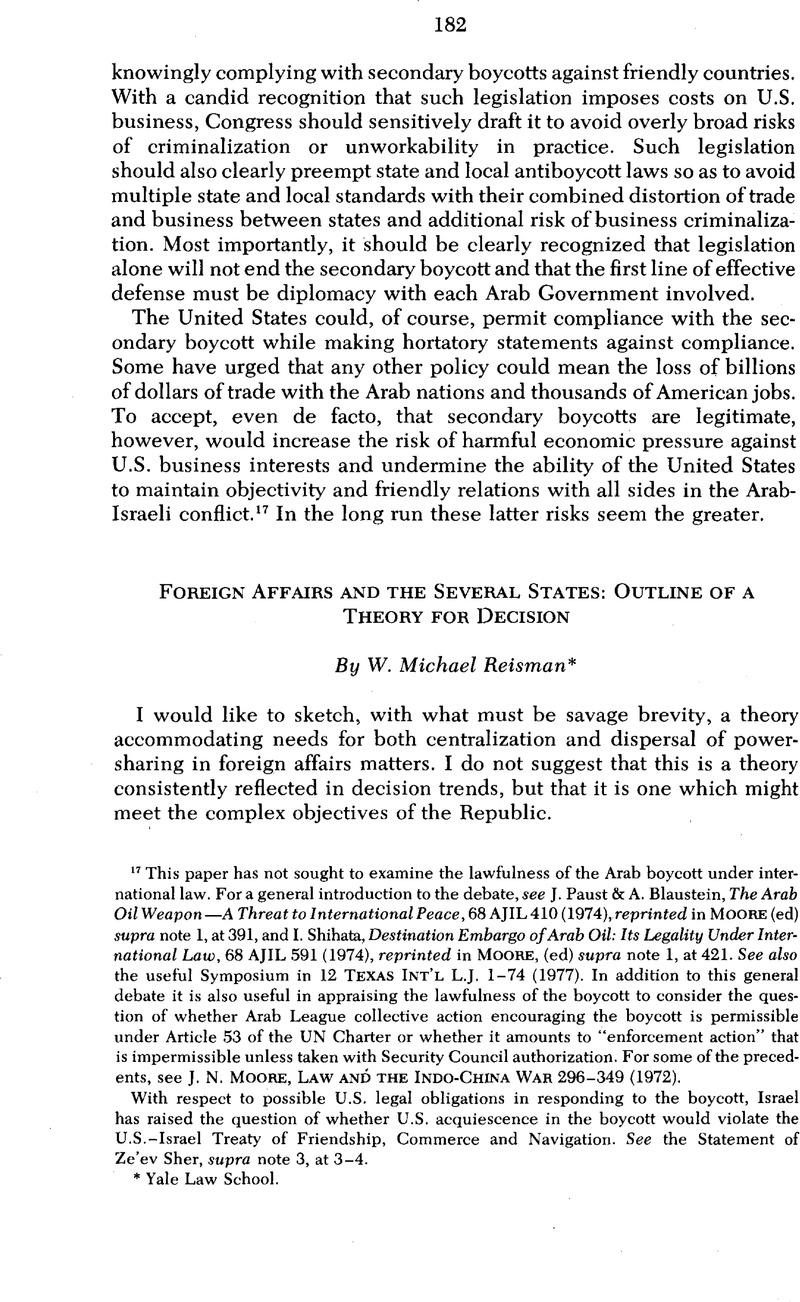No CrossRef data available.
Published online by Cambridge University Press: 28 February 2017

1 L. Henkin, Foreign Affairs and the Constitution 244 (1972).
2 GA Res. 337A (V), 5 GAOR, Supp. (No. 20) 10, UN Doc. A/1775 (1950).
3 The Nuclear Test cases, [1974] ICJ Rep. 253, which makes unilateral statements of political leaders potentially binding on their nations, has certain implications within the United States constitutional system. By characterizing executive statements as effective international commitments, the decisions in these cases raise questions about the appropriate degree of sharing of competence with regard to them between Congress and the executive. See also Rubin, The International Legal Effects of Unilateral Declarations, 71 AJIL 1 (1977).
4 312 U.S. 52, 67(1941).
5 For some preliminary criteria for assessing lawfulness, see W. M. Reisman, Nullity and Revision 836-58 (1971); for detailed criteria for assessing the lawfulness in context of the use of the military instrument, see M. McDougal & F. Feliciano, Law and Minimum World Public Order (1961).
6 For a general survey and documents, see 3 A. Lowenfeld, International Economic Law: Trade Controls for Political Ends (1977).
7 See generally H. Hassouna, The League of Arab States and Regional Disputes (1975); M. Khalil, The Arab States and the Arab League (1962).
8 Arab League Council, Resolution No. 16, Dec. 16, 1945 in 3 A. Lowenfeld, supra note 6, at 99.
9 Arab League Council Resolution No. 357, May 19, 1951.
10 For the Egyptian version, see Law No. 506, October 19, 1955, Journal Official No. 812, reprinted in 3 A. Lowenfeld, supra note 6, at 462.
11 On the much publicized attempt of Arab banking and investment firms to exclude Jewish firms, see NY Times, March 4, 1975, at 43 col. 3. See generally, Cotler et al, The Arab Boycott in Canada: Report of the Commission on Economic Coercion and Discrimination 20 et seq. (1977).
12 See, e.g., Steiner, International Boycotts and Domestic Order: American Involvement in the Arab-Israeli Conflict, 54 Texas L.R. 1355, 1374. (1976).
13 Tax Reform Act of 1976, P.L. 94-455, Part VI: Denial of Certain Tax Benefits for Cooperation with or Participation in International Boycotts and in Connection with the Payment of Certain Bribes. After this paper was delivered, Congress passed and the President signed the Export Administration Amendment Act of 1977, which includes in Section 205 an express preemption clause.
14 The complex of legislation is presented in documentary form with some evaluation of effectiveness in Lowenfeld, supra note 6. See also Steiner, supra note 12, for a similar review, without documents but with assessments of political influences.
15 28 USC §1605.
16 California Business and Professional Code §16721.
17 Id. §16700 et. seq.
18 California v. Zook, 336 U.S. 725 (1949). But see, Jones v. Rath, 97 S. Ct. 1305 (1977).
19 American Committee on Africa et al v. New York Times, Decision of City of New York Commission on Human Rights, July 19, 1974, 13 ILM 962 (1974).
20 Times Co. v. City of New York, 41 NY 2d 345 (1977).
21 Id. at 351-52.
22 Id. at 352.
23 Legal Consequences for States of the Continued Presence of South Africa in Namibia (South West Africa) Notwithstanding Security Council Resolution 276 (1970). [1971] ICJ REP. 16.
24 See Dunhill v. Republic of Cuba, 425 U.S. 682 (1976).
25 41 NY 2d 345, 361.
26 Lake, The “Tar Baby” Option: America Policy Toward Southern Rhodesia (1976).
27 41 NY 2d 345, 352.